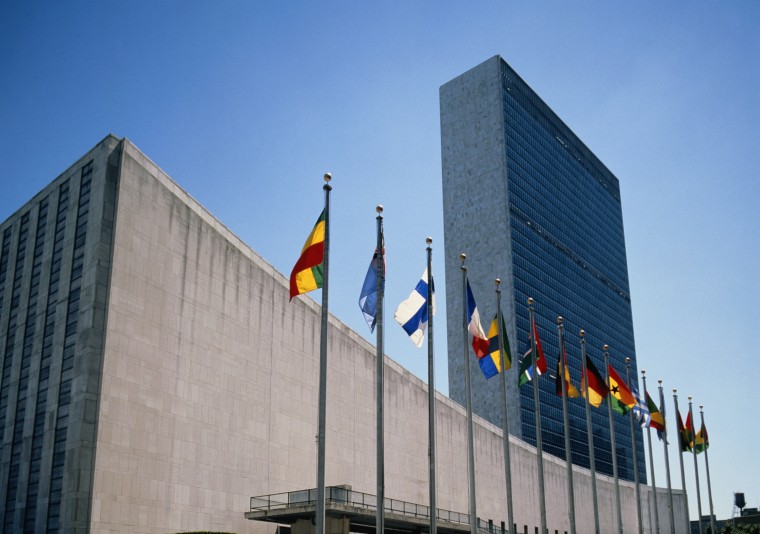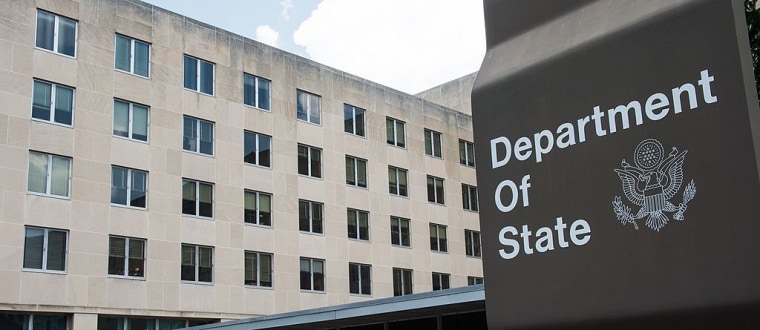The State Department appointed two organizations with anti-LGBTQ track records — the Center for Family and Human Rights (C-FAM) and the Heritage Foundation — as the only two civil society organizations in its delegation to the United Nations' annual Commission on the Status of Women (CSW).
C-FAM has been listed as an anti-LGBTQ hate group by nonprofit civil rights group Southern Poverty Law Center (SPLC) for at least five years. And on C-FAM's website, the majority of its "Worst Moments of the Year for Life and Family at the United Nations" involve the global advancement of LGBTQ rights.
Related: U.S. Sends 'Anti-Gay Hate' Group to U.N.
As for the Heritage Foundation, it has published a number of reports and commentary pieces on its website that are critical of same-sex marriage and the ability of transgender people to use bathrooms that align with their gender identity.
Jessica Stern, executive director of LGBTQ-rights group OutRight Action International, and Ryan Thoreson, a Human Rights Watch fellow focusing on LGBTQ issues, spoke to NBC Out about their deep concerns regarding the appointments of C-FAM and the Heritage Foundation to thia key U.N. meeting.
Why U.N. Participation Matters
The Commission on the Status of Women is “one of the central venues for women’s rights organizing, [where] governments and civil society organizations come together to address issues and craft solutions — and it is an increasingly important space for LGBT rights,” Thoreson said as he stressed the significance of the inclusion of C-FAM and the Heritage Foundation.
The CSW meeting culminates in the creation of a document called the “agreed conclusions,” Stern said. She explained that the document is “negotiated in a room that is entirely full of state delegations. You can only enter the room if you are member of government, a U.N. official or one of the lucky few civil society organizations appointed to the state delegation.”

C-FAM and the Heritage foundation have “access to the very room where the outcome document is negotiated,” Stern added. They are “quite literally sitting at the table. C-FAM and the Heritage Foundation will be advising the U.S. government on what to negotiate and have access to influence other governments.”
"What's interesting here is the expertise gap in the organizations on the present delegation and in 2016," Stern said, noting that last year the State Department chose the International Women's Health Coalition as delegate to attend the CSW.
"You want expertise at the table,” she said, adding that organizations such as the International Women's Health Coalition “have a specialization — the human rights of women and girls."
By contrast, Stern argued, “C-FAM and the Heritage Foundation do not have the expertise to develop credible policy recommendations … [C-FAM] relies on bunk science and fabricated data to support their biased views.”
C-FAM did not respond to a request for comment, and the Heritage Foundation declined to comment on this story.
When asked about their inclusion of two organizations that several advocacy groups have categorized as anti-LGBTQ, the State Department emailed NBC Out the following comment, attributable to a spokesperson for the U.S. Mission to the U.N.:
“The United States seeks to include individuals from civil society organizations with diverse viewpoints to observe the U.N. in action during CSW as public delegates. The Public delegates to the CSW are not U.S. government employees, and they are not authorized to negotiate or speak on behalf of the United States.”
The State Department’s statement downplays the power of civil society organizations by calling them observers and not representatives. However, Thoreson noted C-FAM's appointment “sends a very dangerous signal that the U.S. is tacitly endorsing its more radical positions on LGBT and reproductive rights.” Further, he noted, the meeting provides a “platform for and legitimation of C-FAM’s message.”
“It’s the U.S.’s prerogative to take whichever groups to the CSW that it wishes to take, but it is important for [U.S. Ambassador to the U.N. Nikki Haley] to make clear that U.S. opposes discrimination and violence against LGBT people and will continue to defend the human rights of LGBT people," Thoreson added.
Impact of the Trump Administration
Stern said the inclusion of C-FAM and the Heritage foundation is part of a “series of actions” from the Trump administration that demonstrate a “grotesque lack of regard for human rights.” She cited the expansion of the “global gag rule” that “slashed women’s access to health care and family planning internationally,” as well as the executive order restricting entry into the U.S. from seven countries.
“The executive order not only demonized Muslims … but undermined the safety and security of refugees and asylum seekers in ways that it is difficult to comprehend,” Stern said. The order is a “fundamentally homophobic and transphobic policy along with being xenophobic.”
Related: Trump Immigration Restrictions Could Be LGBTQ 'Death Sentence'
Thoreson provided a contrast with the Obama administration, during which he said, “The U.S. took a real leadership role in saying that violence and discrimination are unacceptable.” There is “concern that the U.S. will abandon its role as a lynchpin of LGBT rights,” he added.
State Department Cutbacks and Future of LGBTQ Rights
The CSW coincides with the release of Trump’s first budget, which proposes slashing funds to the State Department and USAID by an estimated 31 percent.
“Trump delivered a draft budget [that includes] radical cuts to life-saving organizations like UNICEF and the World Food Program, while at the same time increasing the defense budget by $50 billion. Military solutions do not produce human rights outcomes for anyone, including LGBTI people,” Stern said.
Given the “massive cuts” that are planned, it remains unclear “what some of the changes at the State Department will mean for groups that rely on support and assistance from the U.S. government in defending the human rights of LGBT people,” Thoreson said.
Furthermore, last week Secretary Tillerson sent a letter to U.N. advocates and human rights groups indicating the U.S. is reviewing participation in the Human Rights Council and may withdraw if certain reforms are not adopted. For Thoreson, the message appears to be “toe U.S. line or we are going to withdraw.”
This is unfortunate because, according to Thoreson, the Human Rights Council has helped “enormously” in “recognizing LGBT rights as human rights and recognizing the shared humanity of LGBT people.”
“LGBT people around the world are watching and wondering if the U.S. is going to pay lip service to their rights or defend them in a meaningful way," Thoreson added.
Julie Moreau is a Post Doctoral Research Fellow in the Department of Women's, Gender and Sexuality Studies at Washington University in St. Louis. She tweets at @JEMoreau.
